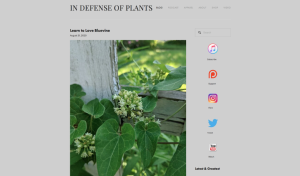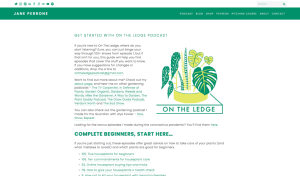General Interest
Back to Top
|
 |
|
The Bard is Born
|
Social studies |
|
Teleport to Warwickshire with The Bard is Born, a digital exhibition honoring William Shakespeare, the "Bard of Avon." Launched in honor of Shakespeare's birthday (celebrated on April 23), readers can enjoy the exhibition's highlights year-round at the link above. This resource, interspersed with pictures and prose, explores the life and work of the famous writer. The content is categorized in several sections, including Shakespeare's Birth and Birthday, Historical Sources for Henry V, and Boydell's Gallery. These various panels provide historical insights on Shakespeare's upbringing and literary influences, with some fun facts that may be new to even devoted fans. For example, a 1769 "jubilee" celebrating Shakespeare's birthday was widely criticized because "not a single line from Shakespeare was performed." The project is curated by Jill Gage and directed by Diane Dillon. It is supported by the Newberry, Chicago's independent research library, in partnership with the Chicago Shakespeare Theater and the Shakespeare Project of Chicago. [EMB] |
|





|
|
 |
|
Pew Report: Parenting Children in the Age of Screens
|
Social studies |
|
Parents and caregivers know that technology use and screen time limits are highly debated topics. As many schools and services move online in light of COVID-19, readers may find themselves modifying their children's technology policy. This report, Parenting Children in the Age of Screens, may provide insights (and comfort in knowing many others are considering the challenges of technology and parenting). Based on data from a March 2020 survey conducted by the Pew Research Center, the report finds "a majority of parents in the United States (66 percent) ... say that parenting is harder today than it was 20 years ago, with many in this group citing technology as a reason why." The main page summarizes the other major findings of the study. For example, the majority of those surveyed felt that children under age 12 should not have their own smartphone. Concerns are not limited to children. Many parents also reported worries that their own technology use "can get in the way of spending quality time with their children." Those surveyed cited many information sources that form their screen time opinions, including healthcare professionals, educators, and social media. The following pages analyze more specific data, including "parental views about YouTube," and "parenting approaches and concerns related to digital devices." The report, published in July 2020, was compiled by a research team including Brooke Auxier, Monica Anderson, Andrew Perrin, and Erica Turner. [EMB] |
|





|
|
 |
|
Science Pickle
|
Science |
|
Designed for educators and enthusiastic learners of any age (though most suitable for middle and high school students), Science Pickle provides various resources (readings, animations, games, and more) for "in-depth, varied, and connectable learning." Activities are "self-paced" and "self-guided," perfect for classroom settings and independent use, especially in an online learning environment. Currently, the site focuses on two concepts. The first concept, Creative Thinking, is divided into three units: Learning, Observing, and Questioning. The second concept, Earth Systems, covers various subtopics, including Energy, Atmosphere, and Precipitation. Each of these topics has learning plans composed of text, graphics, and quizzes that allow users to build (and then test) their skills. For example, the Questioning section begins with an introductory survey, then defines different types of "questioners" (with games to exemplify each), and concludes with a primer on "strategies for questioning." Science Pickle was designed by curriculum developer and former meteorologist John Pickle, who wanted to create a site that brought "self-choice into learning." [EMB] |
|





|
|
 |
|
A Hip-Hop Booklist
|
Language Arts |
|
Filled with intriguing titles like Ibi Zoboi's My Life as an Ice Cream Sandwich the School Library Journal's (SLJ) "A Hip-Hop Booklist" offers an entertaining collection of reads that librarians gearing up for a new school year may find especially useful. Curated by Desiree Thomas, a teen librarian, the list highlights over a dozen titles celebrated for "delving into the genre's multilayered origins in rap, rhythm and soul, poetry and other influences." The list includes books spanning various genres, from young adult fiction novels addressing themes such as "consent, religion, and racism," to memoirs from popular artists such as Rick Ross and Gucci Mane. After browsing the list, readers have the option to add comments, including suggestions of additional applicable books. Readers who enjoy this list may also want to check out "Hip-Hop EDU," a similar resource from SLJ discussing "us[ing] music to spark students' creativity and learning." It is accessible by clicking the link in the yellow box at the top of the page. For over six decades, SLJ has featured information on "issues of interest to the school library and greater educator community." [EMB] |
|





|
|
 |
|
Environmental Justice Atlas
|
Science |
|
Collecting and sharing information and mobilizing communities against environmental injustice, the Environmental Justice Atlas is a "virtual space" for ecological advocates. Readers may want to begin on the About page (under the EJAtlas tab). Here, visitors will find background information on the project, as well as environmental justice, generally. As the About section notes, the Atlas "maps conflicts across 10 main categories," with more than 3,000 cases of ecological conflict included in the database. The Legend section of the Home page explains what each pinpoint signifies (for example, the green leaf is used for "biodiversity conservation conflicts," and the blue icon represents "water management"). Readers may elect to browse the map freely or use the right-hand panel to sort by country, company, commodity, and type. Users can also apply one of the many filters (for example, "impacts" or "outcomes"). Clicking on each pinpoint, users will find information about the conflict, including "the investors ... and their impacts," and "basic data ... [with] project details." Have an idea for a site not yet included? Register an account or fill out a brief survey to contribute. The Atlas is available in seven languages (Arabic, English, French, Italian, Madarin, Spanish, and Turkish). It was created by researchers at the Institute of Environmental Science and Technology at the Universitat Autonoma de Barcelona, with support from the ENVJUST project, the Academic-Activist Co-Production of Knowledge for Environmental Justice, and the Transformations to Sustainability Programme. [EMB] |
|





|
|

















